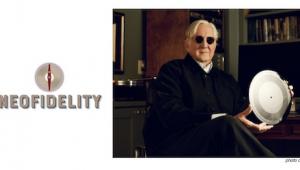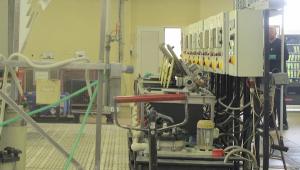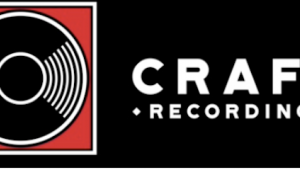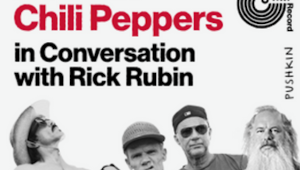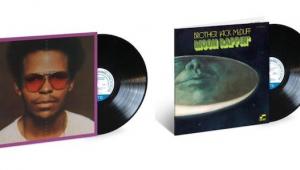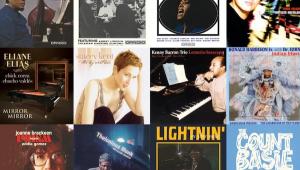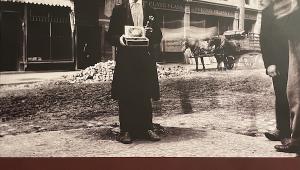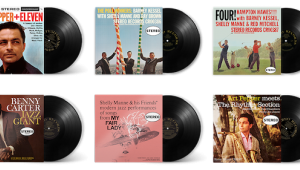Abbey Road 50th Anniversary Edition First Listen!
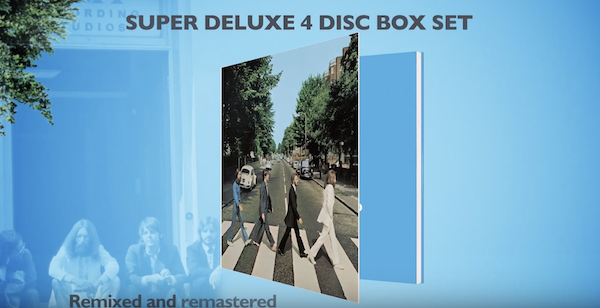
Mr. Martin tore his Achilles tendon playing tennis and for that and a few other reasons, was unable to attend. Guy Hayden, who co-produced The Beatles project and I assume this one as well (haven't seen the credits) filled in. After a short intro in which we were told we'd be hearing excerpts from the new stereo and Dolby Atmos mixes, plus a selection of session and demo recordings, the lights dimmed and you could feel the excitement grow.
I'm telling you what happened next not to embarrass or humiliate anyone but simply to do my job as a reporter: "Come Together" started and it was immediately clear that something was technically "untogether" with the playback. Everything was centered as if in a mono mix! The sound was muddy and exaggerated on bottom and the top end was missing. I couldn't have been the only one sitting there hearing what was terribly wrong and hoping that playback would be halted until it was fixed.
I grew increasingly agitated in my seat. I remember saying to myself "Okay, I know they like to give us the full bottom, but this is ridiculous". I could hardly contain myself. I looked around and there were closed eyes and a lot of "grooving" going on. "Something" was also in mono and clearly it was mono of one of the two tracks centered! Things were missing. What is going on? I almost stood up and shouted "STOP THE SHOW THIS IS WRONG!!!!"
I almost did, but stopped myself. When "Here Comes the Sun" played and there were no handclaps (among other crazy off-kilter and missing elements), I turned to the guy sitting next to me and I said "This is mono!". He said "I don't know, I kind of like it. It sounds very direct!" I said something else to him that I can't recall but before I was finished a guy down the row hit me with some big air brakes as in "SHHHHHHHSSSSHHHH!" I was interfering with his soaking in all of this remixing "genius" and the completely new "take" he was getting from this classic album.
When it was over and the lights came on, Mr. Hayden (who I've know for many years, probably decades now), was embarrassed and profusely apologized for the awful sound and the playback screw up. I blurted out "Why didn't you just stop it???????" He said later outside the screening room that he kept hoping it would be fixed, but unfortunately it was not. He self-admitted to being a feline. However it was a relief to know what we heard was not right!
After a pause, we got to hear the Atmos mix and there finally got to hear how it was supposed to sound. By that I don't mean to endorse (or not) Atmos. What we heard was the mix we were expecting to hear with some added room sound and height. The Atmos track was produced by playing the stereo mix back in studio two on carefully placed speakers and recording the room. That element as the rear, side and height channels definitely added some "space" without doing damage to the stereo mix.
So how did it sound? Unlike the Sgt. Pepper's.... remix where elements were placed where they would have gone and would have been sourced from the first generation tape had the technology allowed—all of which IMO made for a far better mix—here there was far less for Mr. Martin to do since the original mix was so clean and orderly to begin with, especially since the track recordings were too. For instance Geoff Emerick placed the group around the microphone each the correct distance from it to achieve a perfect vocal blend so there was no need for and no way to do post-production mixing (he complained bitterly about the 2009 re-mastered reissue saying that the dynamic compression ruined the blend he'd worked so hard to achieve). Where vocals were originally placed on one channel, they were left there here. I didn't hear any placement surprises in the few tracks we did hear.
We heard a very orderly mix with few surprises, one of the biggest being the bass drum on "Come Together", which now was delightfully explosive and sounded right—as if it had been missing before—not as if more was added to satisfy Ringo!
Otherwise I honestly cannot say that compared to an original U.K. pressing (a digitized 96/24 version of which I supplied to someone at Abbey Road over the winter as a reference) and based solely on what I heard on an unfamiliar though perfectly calibrated theater system, I heard any great surprises, which to me is a good thing. However, that's compared to an original U.K. pressing! People familiar only with Capitol's blah original or EMI's "committee" remaster (but not remix) will surely be very happy Beatles fans! I'm optimistic that the high resolution digital and vinyl reissues, when I finally get them, will sound great!
As for the outtakes we heard, there was a take of George Harrison's "Old Brown Shoe", a hilarious "She's So Heavy" wherein Billy Preston goes absolutely batshit crazy on the organ (it was wiped for the final mix and replaced, as you know, with white noise), Ringo screwing up "Octopus's Garden", which in addition to bringing some humor, demonstrated how great these guys were playing live, together in the studio. There was also a very saccharine song from Paul, with which I was unfamiliar, that had me imagining John rolling his eyes at (cue the Beatles fanatics exclaiming "What? You don't know 'blah blah blah'? It's on these four outtake boots!").
This just in: The "saccharine song" is "Goodbye," which Paul gave to Mary Hopkin. Went to #2 in the UK (only behind "Get Back"). Here in America, it peaked at #13 (thanks to Tom Frangione of the SiriusXM The Beatles channel).
There were a few other outtakes and most interestingly George Martin's luxurious, appropriately romantic string bed for "Something", which on the original mix (and in this remix) was tucked well into the background so it's hardly noticed, though its absence would be. Heard alone, it's quite moving and demonstrates Martin's importance to the group, but as Mr. Hayden admitted, compared to The Beatles, there simply were not that many outtakes or discards. Hayden also said that the tapes were in perfect shape and that only a few of the multitrack tracks required the tapes to be "baked".
Listening to the screwed up first playback, even the most obtuse listener surely must have noticed that during the guitar solos on "The End", every other solo simply disappeared! And that on "Her Majesty", which has heavy left/right panning, Paul too, just disappeared! It was truly bizarre.
I also got to paw the deluxe LP jacket sized hard cover book written by Kevin Howlett (who in addition to writing other material for The Beatles, wrote 2018's "A Century of Accuracy in Sound" for Ortofon's 100th anniversary and did an equally outstanding job there). Great photos, well laid-out and I look forward to reading the annotation.
The afternoon session attended by Jim Austin, Art Dudley and John Atkinson among others no doubt went far better! In any case, I left the morning session feeling bad for the embarrassment and good for what I heard after the problem was corrected. I think this will be a gentle, modestly improved remix of what originally was a mix that many of us felt was not in need of remixing, but better to withhold that judgement until we get to hear this one at home! I did lobby for an all-analog AAA vinyl reissue cut from the original 1969 2 track master tape, packaged in a deluxe, "Clairfoil"-like "fold-over" jacket, but don't hold your breath waiting for that (which doesn't mean it won't happen, just not likely any time soon!).
Based on a few comments and other feedback it is not my intention to leave anyone thinking this remix is a failure. Based on what I heard of the Atmos playback, it was done, as expected, with care and precision, though unlike the previous two, was closer to the original, which most consider "classic" and beyond reproach. One thing Mr. Hayden said popped back into my memory as I typed this: he said one of the reasons for the remix was to make Abbey Road as an album or as individual tracks from the album more compatible with contemporary music so in a playlist assembled by young people it would not "stick out". I get that. No one wants to see (or hear) The Beatles get lost in time, though does anyone really think that might happen? So far over the last 50 years the group appears to be doing well with each successive generation.




